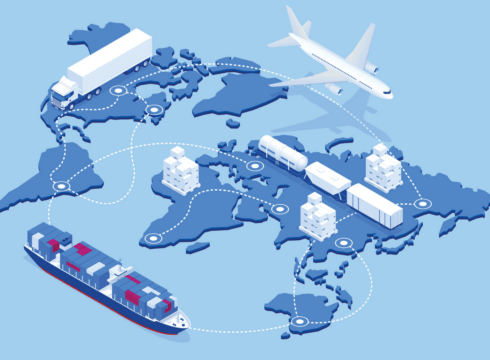A digital supply chain platform is essential for today's sustainable supply chain
Supply chains must be future-proofed as organisations adapt to the new normal by minimising complexity and uncertainty
Read more to find out how you can build strength and resilience into your own supply chain
Inc42 Daily Brief
Stay Ahead With Daily News & Analysis on India’s Tech & Startup Economy
Effective supply chain management is essential for corporate efficiency, agility, and profitability. Technology has made it easier to obtain and use data to improve process management and make better decisions, making digital the new normal for most business tasks. The importance of an integrated supply management has grown as a result of technical improvements and changes in customer expectations.
A digital supply chain platform is essential for today’s sustainable supply chain. Digitisation of business operations has become more of a requirement than a value-add proposition for manufacturing organisations in order to create large customer bases. As a result, there has been an increase in the need for a digital realm that seamlessly integrates supply chain operations. Businesses now need end-to-end supply chain solutions that help them achieve operational excellence along with excellent customer experience.
A Sustainable Supply Chain Strategy Needs Tech
Supply chain management relies heavily on near real-time or real-time data. As a result, the supply chain management system is developed to organise and improve the exchange of information across numerous key supply chain partners to achieve outcomes such as just-in-time procurement, inventory reduction, increased manufacturing efficiency, and meeting customer needs on a timely basis.
However, in order to achieve efficiency, visibility, and security of supply chain member interactions for profit, the current and future economic, ecological, and societal objectives must be incorporated.
According to a study by McKinsey, a sustainability strategy can significantly reduce costs and increase operating profits by up to 60%. Sustainability is, thus, an essential feature of supply chain management. However, sustainable supply chains require a global view of inventory that is accurate, real-time, and can be shared across a supply chain ecosystem in a trusted manner. The role of technology in this process cannot be overstated. Let’s look at today’s global supply chain and how you can build strength and resilience into your own supply chain.
Optimum Inventory Management
Companies’ sustainability initiatives can be greatly aided by properly sizing their inventory levels. This improves your working capital for other strategic initiatives while improving service levels, reducing unplanned downtime, and optimising inventory. Inventory management software can aid in the reduction of waste and environmental impact by providing an accurate granular view of inventory performance and recommending optimal inventory levels for each stock item.
In retail, for instance, a sale might be made or lost based on global inventory visibility. Solutions that allow you to check stock across multiple locations and get up-to-the-minute views on what’s available nearby or in transit empower you to reduce your environmental impact.
Supply chain visibility can be improved by enhanced track-and-trace technologies and enterprise resource planning (ERP). With great visibility, you can see your moving inventory and implement proactive risk-mitigation procedures. Customised warnings and thresholds allow you to reduce waste, safety stock, markdowns, and carry costs while also increasing the footprints of your stores and distribution centres and maximising profits.
Ensuring Fulfilment Optimisation
Leading retailers and brands (B2C and B2B) are currently hyper-focused on omnichannel order fulfilment in order to deliver customers the appropriate products at the right time and place. More eco-friendly methods are also available for achieving the same outcome.
In order to cut carbon emissions, you can employ AI and sophisticated analytics to augment and extend your existing order management systems. At the lowest possible cost to service, logistical emissions can be reduced and fulfilment optimised.
Tracking Product Provenance
Incorporating cloud and IoT technology can help you create a thriving ecosystem of business partners who share your core values. It is possible to assure product quality and provenance by sharing data over a distributed and immutable ledger, decreasing product waste while enhancing profitability, and you can securely deal with supply chain partners.
Because of the increasing number of people who identify as ‘purpose-driven’, it is critical to equip these consumers with the information they need to make purchasing decisions that are aligned with their beliefs.
Key Takeaways
Establishing supply chain resilience in today’s rapidly changing environment is more critical than ever. Decisions about which technologies to use will help a company withstand upheavals, continue business as usual, and keep growing. In order to maintain a successful supply chain, new technologies that improve efficiency and automate processes must be employed.
Businesses can increase their order fill rate and inventory levels with the help of distributed inventory flow forecasting (DIFF), for instance. AMRs may emerge as a technique of enhancing pickup procedures while warehouse management systems continue to control duties like loading and unloading.
Aside from that, the use of blockchain technology can expedite cross-border transactions in a variety of different areas, including invoicing, planning, shipment authorisation, contracts, and volume management, among others. The advent of 3D printing has made it possible to make and replicate new parts without the need to stock up on inventory in warehouses. Using a local 3D printing shop to create and ship the part could be a time-saving option.
Supply chains must be future-proofed as organisations adapt to the new normal by minimising complexity and uncertainty. Managing supply chains in the future will necessitate increased digitisation and smart technology. Businesses can benefit from digital transformation in a variety of ways, including increased visibility, improved collaboration, and predictive capabilities, in addition to inventory management, fulfilment optimisation, and product provenance.
{{#name}}{{name}}{{/name}}{{^name}}-{{/name}}
{{#description}}{{description}}...{{/description}}{{^description}}-{{/description}}
Note: We at Inc42 take our ethics very seriously. More information about it can be found here.


